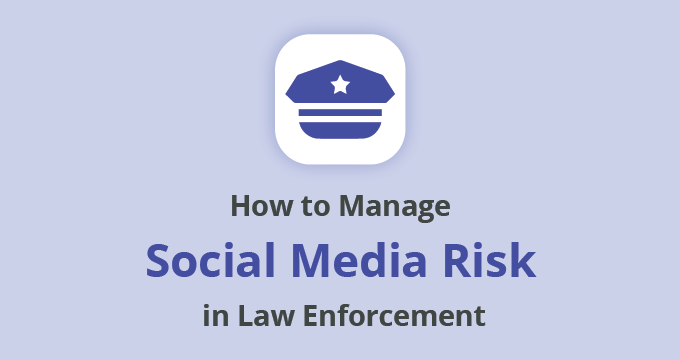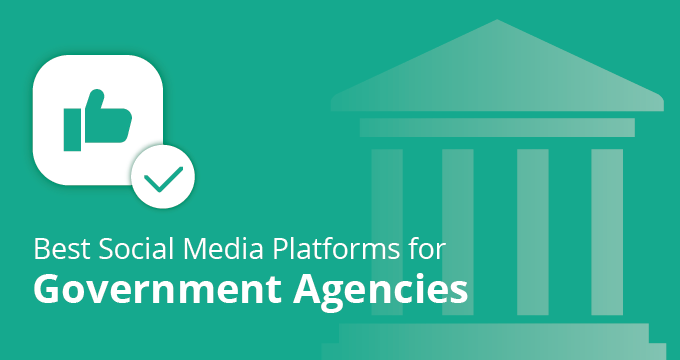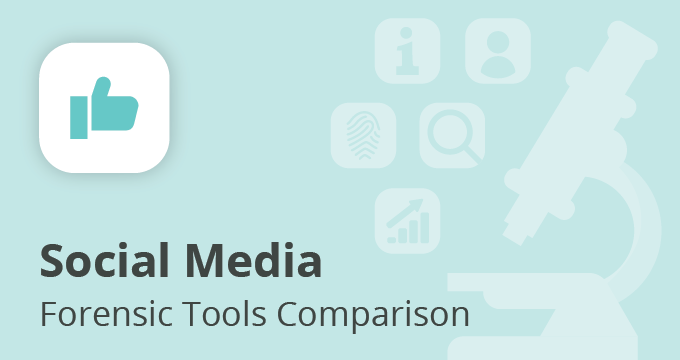With over 90% of the U.S. population using social media regularly, it’s no surprise that every branch of government needs to be involved, including law enforcement.
While it provides many benefits, social media for law enforcement comes with its set of risks and challenges that need to be managed for a safe and effective use.
In this article, we’ll go over:
- Benefits of having social media for law enforcement agencies
- Biggest social media risks for law enforcement
- How to establish an effective social media policy
- How to monitor social media and respond to crises
- How social media archiving helps solve your problems
Why Law Enforcement Agencies Should Be on Socials
You may think police social media should not be a thing — but in reality, platforms like X, Facebook, Instagram and TikTok are the biggest channels for sharing information and communicating with the community.
For law enforcement, social media can be used to:
- Engage with the community — Engage your citizens, make them feel safe, explain interesting topics, and showcase your work in the community.
- Build trust — Participate actively, respond to comments and share everyday stories, and you’ll seem a lot more approachable and “human”.
- Communicate emergencies — In case of emergencies, amber alerts, or natural disasters, socials and text messages are the best and fastest ways to alert citizens.
- Showcase your work — Inform the public about crime prevention and arrests. People will appreciate it because they like to have the latest information.
- Debunk false information — Be the voice to inform everyone about the truth.
- Prevent new crimes — Following up on leads from social media can help you learn of potential crimes that you can prevent.
These are just a few of the benefits of social media for law enforcement that you can expect, but there are also risks you need to be aware of.
| Related: How To Create an Effective Government Social Media Strategy |
The Risks of Social Media for Law Enforcement
If public entities, such as law enforcement, want to coexist successfully with the public in this space, they need to accept that this won’t always be easy or pleasant.
There are many obstacles to overcome when using social media as a law enforcement agency.
Trustworthiness
Typical PR isn’t enough for the success of law enforcement when it comes to social media, but being transparent with the community can make it easier for you to build trust.
By showcasing police work to the public, law enforcement can feel more human.
Legal challenges
Engaging with social media can be a double-edged sword when it comes to legal proceedings.
There are many laws regulating how you can utilize social media, what your obligations are, and what the repercussions for breaking them are.
You need to be aware of these laws and what you can share on social media, especially when it comes to citizens’ personal information.
On the other hand, presenting social media posts, comments, and conversations as evidence brings with it its own set of challenges.
While social media evidence can help your investigation, it needs to adhere to legal standards in terms of format and evidentiary quality.
Privacy concerns
While sharing your staff on social media is great for humanizing them it presents a privacy risk, especially if they are performing investigations or are undercover officers.
You need to be aware of what you can share on social media not to reveal personal information about anyone at your police department.
This extends to any crimes, criminals, or investigation evidence being processed.
Defamation
Remember that social media is full of all kinds of people and some of them mean you harm in the form of defamation.
It can come in the form of inappropriate comments on social media or lies spread all over the internet to which you need to be careful how you react.
Some of these inappropriate comments could include profanity, crudeness, and even threats of violence.
Police social media guidelines should address such situations, as well as possible actions.
For instance, by clearly stating what an inappropriate comment looks like, the law enforcement agency will have an additional layer of protection when opting to remove it.
All of these risks need to be covered in your social media policy, as this will help you navigate the difficulties of social media in law enforcement.
Establishing a Law Enforcement Social Media Policy
With no specific federal legislation governing the use of social media for police departments, many agencies still don’t have a social media policy.
This opens you up to many risks and having one is very important when deciding to engage with social media.
To help law enforcement agencies benefit from social media while mitigating unnecessary risks, a police social media policy should ensure:
- Clear guidelines on personal and professional use of social media.
- Use of social media under relevant laws and policies.
- Protection of officers and the public’s private data.
- Guidelines for documenting and archiving social media data.
- Guidelines for using and evaluating evidence from social media.
- Social media monitoring protocols.
- Crisis communication.
To ensure all of this you need to cover the following topics in your law enforcement social media policy:
- Purpose — Clearly define the purpose and context of how social media aligns with your police department.
- Definitions — Include key social media terms and ensure they are understood.
- Access — Specify who is authorized to represent your department on social media.
- Privacy guidelines — Emphasize the importance of personal information privacy.
- Content guidelines — Define the type of content you will include in your social media channels.
- Approval process — Define a step-by-step process from creation to posting of content, as well as the process of communicating with the public.
- Personal and professional use — Guide acceptable context for different uses of social media.
- Investigation use — Define the process for utilizing social media for gathering evidence.
- Recordkeeping — Invest in an archiving solution and develop an appropriate data retention policy.
These points will be the core of your social media strategy, from content creation, and communication, all the way to investigation purposes.
But creating a law enforcement social media policy is just the beginning.
The next big step is getting the staff to adopt and follow these guidelines when using social media for law enforcement agencies, especially in times of crisis.
How to Monitor Social Media and Respond to Crises
As mentioned, social media presents a great opportunity for detecting crimes before they happen and taking appropriate measures.
To take advantage of this, you’ll need to create a social media monitoring/crisis strategy.
This requires you to first identify the key platforms, groups, and terms used to communicate crimes over social media. You can then regularly search for these terms to identify potential crimes. These terms should be updated regularly as criminals start noticing that you’re tracking them.
The second part of your strategy should be focused on community and partnerships.
Create your hashtags, have open chats, and talk to your citizens. Open up as many opportunities as possible for the community to report crimes to you.
Third, create your crisis response plan.
Having a crisis plan on how to react is essential. Whether the situation is triggered by an offline or an online event, it must be managed carefully.
Here are some of the tips for good crisis management:
- Be honest, open, and authentic.
- Inform the public about an incident transparently and promptly.
- Foster dialogue and respect people’s emotions.
- Answer the most relevant questions straightforwardly.
- Take ownership of mistakes.
- Avoid shifting blame and empty statements.
The Role of Social Media Archiving In Law Enforcement
Although there aren’t any specific social media regulations enforced upon law enforcement agencies, you’re still obligated to keep accurate records of all communications.
This includes social media as it is subject to the Freedom of Information Act and Open Records laws.
With this in mind, law enforcement agencies should opt for a social media archiving solution that captures and stores all social media content in an accessible way.
Modern social media archiving solutions have many features that help you easily comply with all record retention laws.
Some of the most important features to look for are:
- Automatic data capture — The solution needs to capture all social media records of communication including posts and comments from all of your social media channels without any need for manual work.
- Encryption — The captured data needs to be secure from any potential breaches with the latest encryption standards.
- Message integrity — If you’re using social media as evidence, you need to prove it hasn’t been tampered with. Integrity checks help you prove the data is in its captured state.
- Advanced search — The solution needs many options to find the exact data you are looking for.
- Alerts — The solution needs to be able to alert you of potentially dangerous social media behavior by automatically searching for pre-defined restricted keywords and phrases.
- Audit trails — In the case of archive misuse, audit trails allow you to pinpoint who used the archive and what was changed which allows you to present accurate evidence to a court.
With the right social media policy and robust solution, you can be sure you’ll remain compliant.
Rather than ignoring the benefits and potential risks, investing in a social media archiving solution for your law enforcement agency should be your top priority.
Solve all of your social media compliance needs with Jatheon’s archiving solution.built for businesses of all sizes. Stay compliant, speed up your ediscovery, and retain all of your business data in one easy-to-use solution.
Read Next:Why Social Media Archiving Matters for Regulated Industries |








